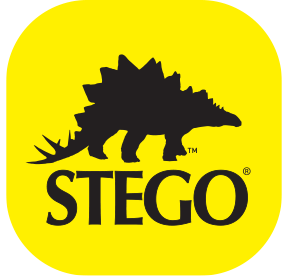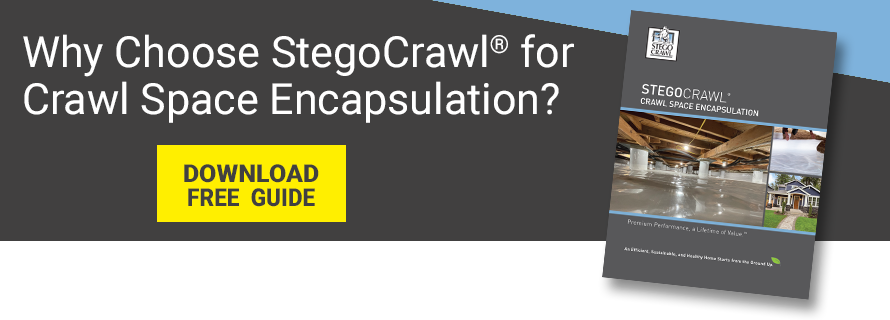Top 3 Things to Look for in a Crawl Space Vapor Barrier Manufacturer
Although quality moisture protection is a crucial part of protecting all buildings, we are often guilty of not taking the time to fully research vapor barrier products and suppliers. Then, after the project is finished and the moisture-related problems begin, we scratch our heads in frustration, wondering how this could have happened.

Image Source: Stego® Industries, LLC
A vapor barrier is the last line of defense between your basement or crawl space and the moisture sources beneath your home. That’s why it’s important to do your research on which manufacturer you are buying from, whether you are choosing materials at a local hardware store or talking with a contractor. The top three factors you should consider in a vapor barrier manufacturer are: High-quality products that adhere to industry code requirements, superior customer service, and reasonable prices.
1) High-Quality Products
One of the most important components of a successful project is procuring high-quality products that are in compliance with industry standards. It is also important that your manufacturer is in compliance with local regulations. These often change, so it is important to know that your supplier can provide documentation that shows compliance with the most recent codes. Ideally, when looking for a vapor barrier manufacturer, you should confirm that their products not only comply with all the current codes and industry testing methods, but go above and beyond them.
A good manufacturer will be in compliance with the industry test methods defined by the International Residential Code (IRC) and the Radon Resistant New Construction (RRNC) techniques used for testing vapor barriers. For example, standard polyethylene vapor barriers that typically can be purchased at any common hardware store do not meet the requirements of RRNC 2.0, are not fire rated, and are subject to deterioration. Good quality vapor barriers sold by a reputable manufacturer adhere to the requirements of RRNC section 2.0, have a Class A fire rating, and a Class I rating under the IRC section R601.3.
In addition, it is of the utmost importance that a vapor barrier manufacturer have a third party conduct testing of materials and document test methods that were performed. In order to be valid, all test methods should be conducted on the same roll of vapor barrier that is to be sold. This procedure is also documented in ASTM E1745 paragraph 8 in regards to sampling.
The industry standard ASTM E1745, “Standard Specification for Plastic Water Vapor Retarders Used in Contact with Soil or Granular Fill under Concrete Slabs,” outlines the expectations for a high-quality vapor barrier, and a good manufacturer will offer materials that not only meet these expectations but exceed them. In order to make sure you are getting the best product possible and ensure the success of your project, it is important to be knowledgeable about the most important characteristics that a high-quality vapor should have. These are:
- No reprocessed resins or fillers: Reprocessed resins and filler materials compromise the integrity of a material, causing it to be weaker and more prone to vapor permeance, punctures, tears, and deterioration. A quality vapor barrier is manufactured out of pure resin compounds that provide consistent strength, low permeance, puncture resistance, and resistance to degradation.
- High tensile strength: An important characteristic of a high-quality vapor barrier is high tensile strength. Tensile strength measures the plastic sheathing's ability to resist tears under tension. The test method for tensile strength is defined in ASTM E1745 for vapor barriers under slabs, in walls, or in contact with the ground. Extremely high tensile strength can be achieved without string (scrim) reinforcement.
- High push-through puncture resistance: This quality defines the material's ability to resist punctures during the construction process. A vapor barrier with high puncture resistance can withstand potential damage from equipment, rocks, debris, and foot traffic.
- Low permeance: One of the most important characteristics of a good vapor barrier is its ability to prevent moisture from migrating through it. This is measured in perms, and unlike tensile strength or puncture resistance, the lower permeance the better. A vapor barrier is defined in the industry as a material with 0.01 perms or less when tested under ASTM E1249 or ASTM E96.
- Degradation resistance: Long-lasting vapor barriers can withstand the environment that they are exposed to once installed. Oxidation is one of the main causes of degradation of lower quality barriers. There are several test methods outlined in ASTM E154 that can be used to determine a vapor barrier's resistance to these substances.
- Ease of installation: This is a vital but often overlooked quality when considering moisture proofing a crawl space. A good quality vapor barrier will have well thought out product sizes, material dimensions, and accompanying accessories to make the installation process as easy as possible. It will also have clear and concise instructions for installing and have pliable materials that are easy to handle in a crawl space environment.
2) Superior Customer Service
In addition to product quality, the assurance that you will have quick and reliable access to the information you need is extremely important when choosing the right manufacturer for your project. Two key components of quality service will be indicated by:
- Availability: Phone helpline where customers can speak to an industry expert and an email contact form with a quick response policy are hallmarks of a quality manufacturer.
- Knowledge of products and services: Experienced and qualified professionals that can answer questions about their products is a good sign. The manufacturer should also have thorough and straightforward product information provided on their website, along with product-relevant content specific to common consumer questions.
3) Reasonable Product Prices
Another factor to consider when choosing a vapor barrier manufacturer is pricing. You want the best quality product for your job, but you also should pay a fair price. Manufacturers that provide a range of materials with various tensile strengths, permeance, and puncture resistance should have a range of pricing for the various qualities of products. Good quality vapor barriers can range from $0.15/sq. ft. to $1.00/sq. ft. for thickness of 10 mil to 90 mil. Gauging the cost against the vapor barrier’s quality will help to make sure you are paying the right price for your product.
Finding a manufacturer that has quality products that adhere to industry code requirements, has excellent customer support, and reasonable product prices is key to successfully purchasing the right vapor barrier for your project. Stego® Industries is a leader in moisture protection products and strives to exceed industry standards and client expectations. When looking for a high-quality vapor barrier for your crawl space, StegoCrawl® is an easy-to-install solution that has been certified to meet and exceed industry standards.

Written by Tom Marks
Tom Marks is the Business Development Project Manager with Stego Industries, LLC. He has been with Stego since 2007, serving many years as the Rocky Mountains Regional Manager. Now, his focus is geared toward vapor barrier solutions for new and existing homes as the Product Manager of the StegoHome and StegoCrawl brands. In addition, Tom serves as Sustainability Manager, overseeing Stego’s leadership in holistic product and corporate sustainability. Tom enjoys working with a wide range of project team members and customers to incorporate effective sub-slab vapor protection and create healthy, sustainable homes and buildings.
- Stego (26)
- StegoCrawl (24)
- Stego-Awareness (17)
- StegoHome (15)
- Case Studies (14)
- StegoCrawl-Consideration (12)
- StegoCrawl-Awareness (11)
- Customer Stories (9)
- Stego-Consideration (9)
- Pango (8)
- StegoHome-Consideration (8)
- Beast (7)
- How to Install (7)
- StegoHome-Awareness (7)
- Drago (5)
- Pango-Awareness (5)
- Beast-Awareness (4)
- Beast-Consideration (3)
- Drago-Awareness (3)
- Pango-Consideration (3)
- Stego IQ (3)
- Drago-Consideration (2)
- StegoCrawl-Decision (2)
Popular Posts
Stay Connected.
Enter your email below.







Post Comments